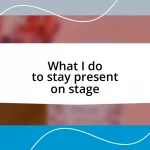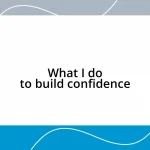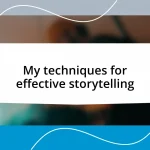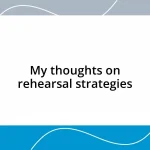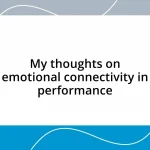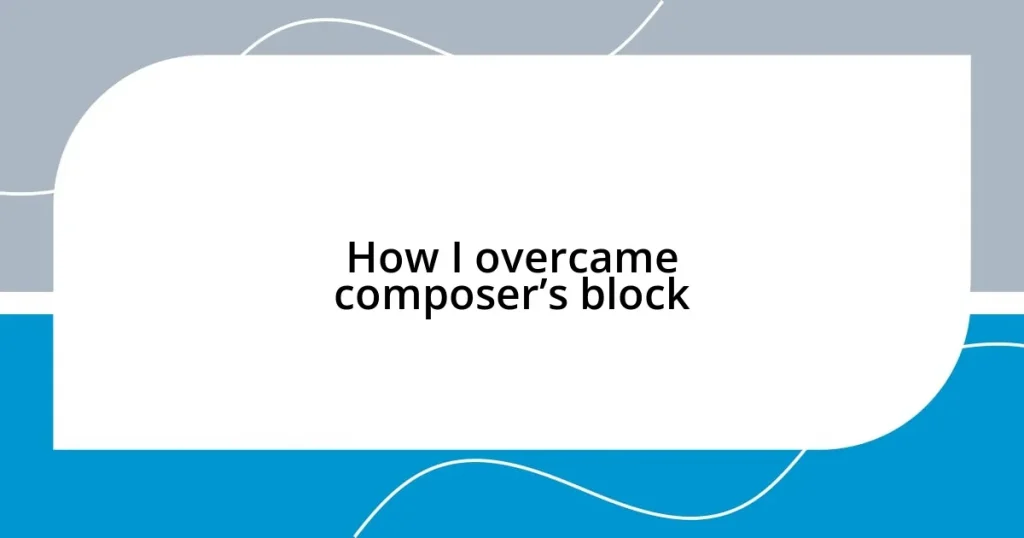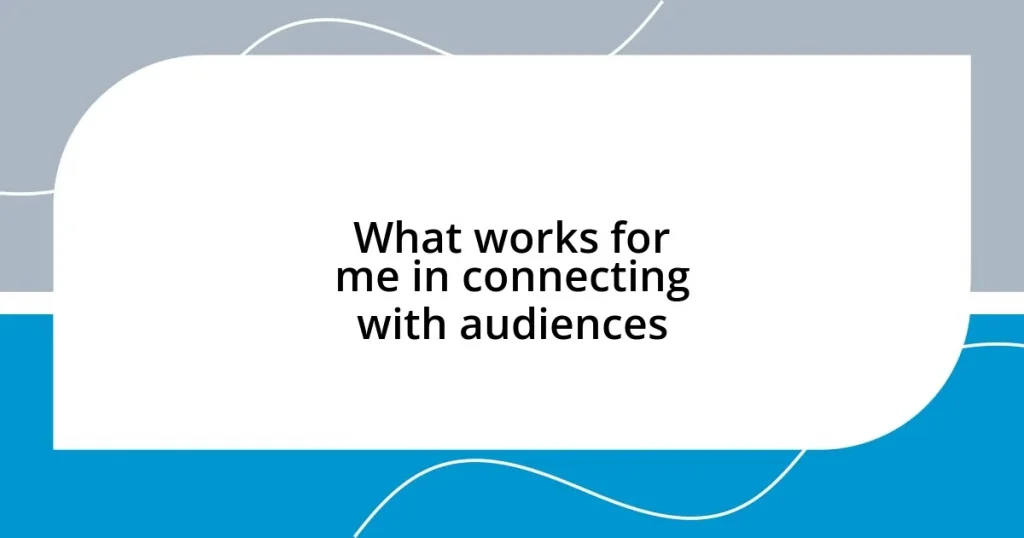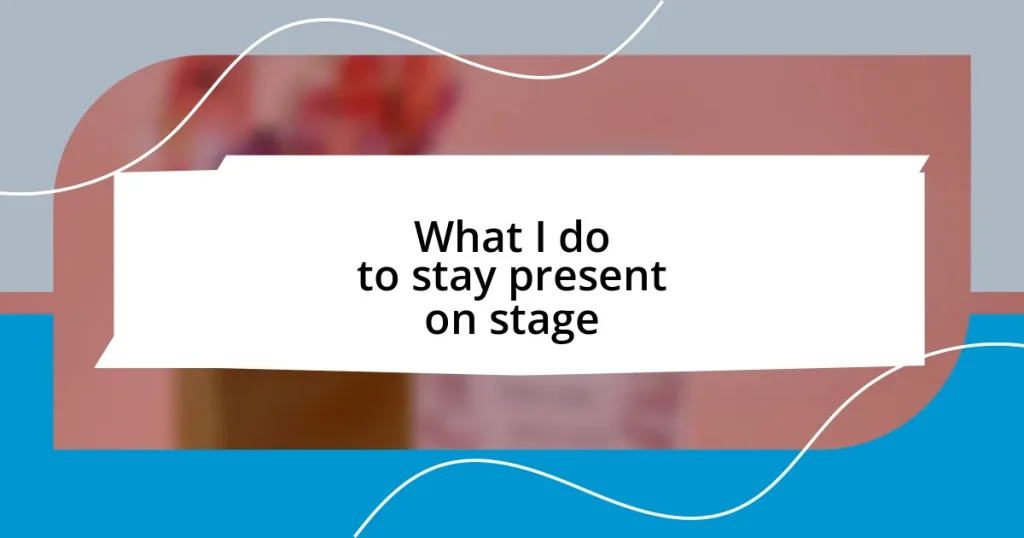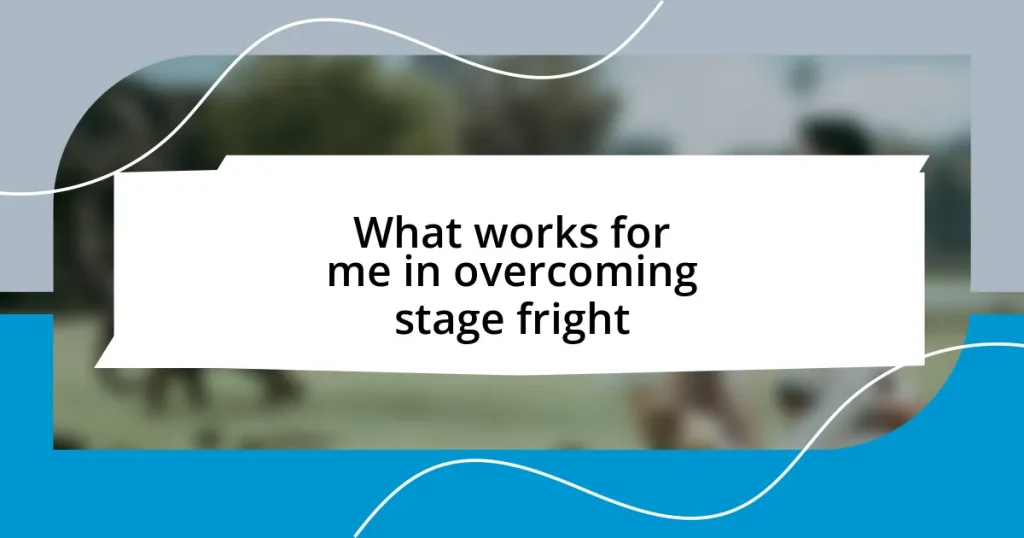Key takeaways:
- Composer’s block arises from various factors such as fear of failure, perfectionism, stress, self-doubt, and burnout.
- Changing the environment, setting small goals, and collaborating with others are effective techniques to overcome composer’s block.
- Creative exercises like free writing, visual art inspiration, and playful musical constraints can reignite creativity.
- Maintaining a productive mindset involves an inspiring workspace, taking regular breaks, and practicing self-compassion during creative lulls.
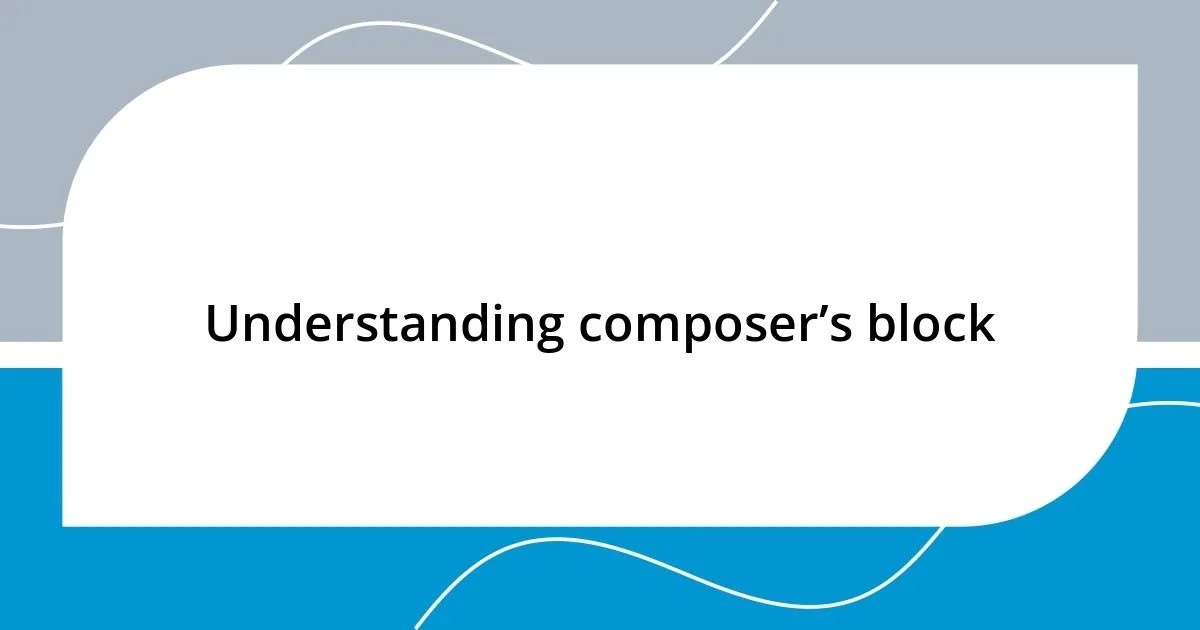
Understanding composer’s block
Composer’s block is one of those frustrating experiences that every creator dreads. It often feels like an invisible wall, leaving you staring at a blank page even when inspiration once flowed freely. I remember sitting at my piano, fingers hovering over the keys, battling that crushing silence; it was both disheartening and confusing.
What’s intriguing about composer’s block is its different causes—stress, perfectionism, or even fear of failure. I often find myself caught in the trap of wanting everything I create to be perfect right from the start, which only deepens that feeling of being stuck. Have you ever felt that pressure to produce a masterpiece, only to end up writing nothing? It’s a common dilemma that many of us face, and recognizing it can be the first step to overcoming it.
Sometimes, simply understanding that composer’s block is a natural part of the creative process can shift my perspective. It’s essential to remind ourselves that even the most celebrated composers experienced their fair share of creative lulls. I’ve come to realize that allowing myself to experience that block can spark new ideas, often leading to unexpected breakthroughs once I give myself the grace to step back and breathe.
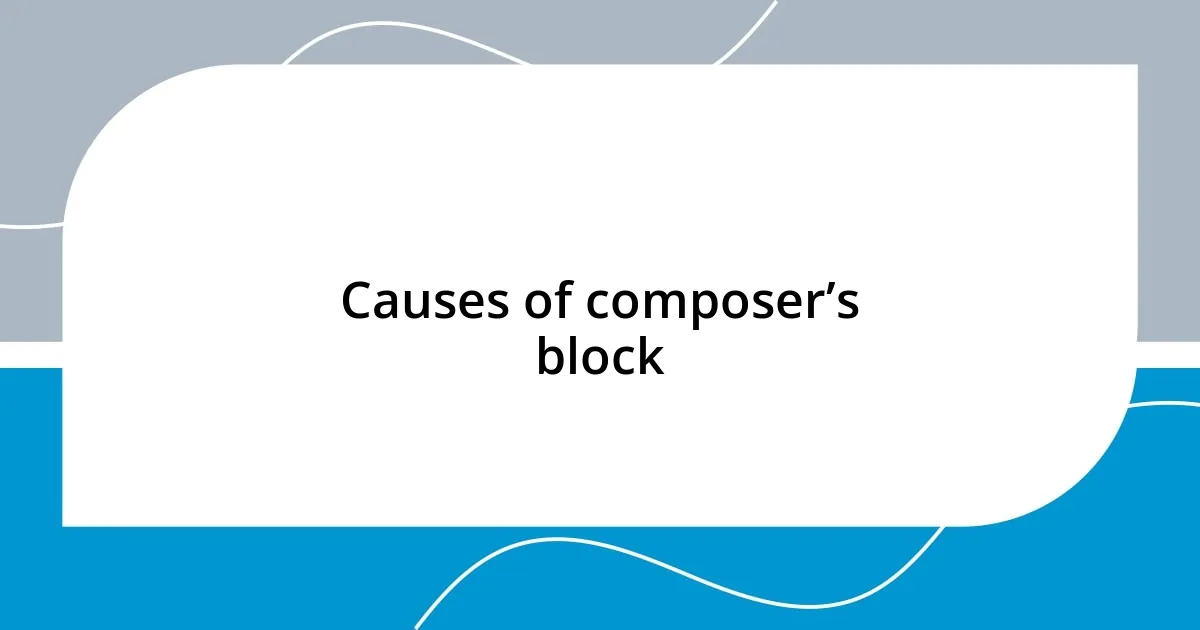
Causes of composer’s block
Often, I find that the pressure of deadlines serves as a significant cause of composer’s block. When I have an impending project, the weight of urgency can stifle creativity. I remember a time when I had a composition due for a class recital; instead of motivating me, the ticking clock tightened my chest until I panicked, unwilling to let an idea flow.
Here are some common causes that can contribute to the onset of composer’s block:
- Fear of failure: This can paralyze my creativity, leading me to overthink every note.
- Perfectionism: I often struggle with wanting every piece to be flawless instead of just letting my ideas flow.
- Stress: External pressures from daily life can overshadow my ability to focus on music.
- Self-doubt: I sometimes question my skills, leading to a mental fog that stifles my creativity.
- Burnout: There have been times when I pushed myself too hard without breaks, leaving my mind feeling empty.
Understanding these causes is the first step toward addressing them, and it often gives me the tools to push through when the creative well feels dry.
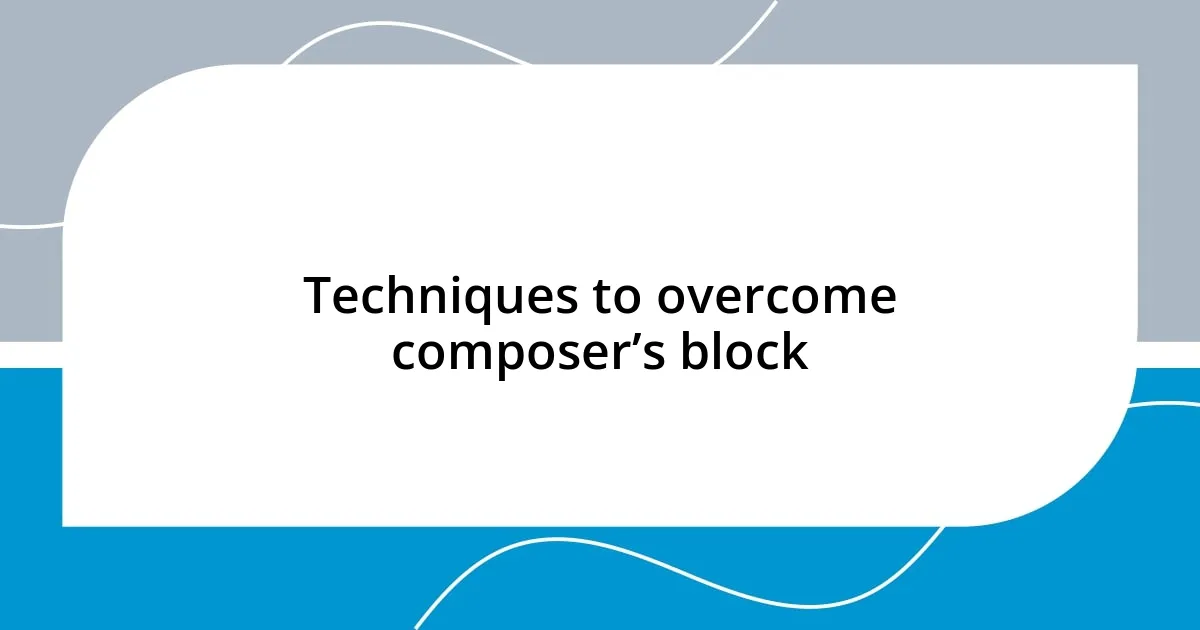
Techniques to overcome composer’s block
One effective technique I’ve found to overcome composer’s block is changing my environment. Sometimes, all it takes is a new setting to ignite my creativity. I remember one particularly dull day when I decided to take my notebook to a local park. The sound of birds chirping and the sight of people enjoying their day sparked melodies in my mind that had been dormant for weeks.
Another strategy I cherish is setting small, achievable goals. I’ve often found myself overwhelmed by the prospect of starting a big project, but breaking it down makes it manageable. For instance, I might commit to writing just one measure or even a simple melody each day. This approach has helped me build momentum, turning what once felt impossible into a series of small wins that eventually culminate in complete compositions.
Lastly, I’ve discovered that collaborating with fellow musicians can break the block. Sharing ideas with others not only gives me fresh perspectives but also alleviates the loneliness that often accompanies composer’s block. One of my favorite experiences was a jam session where spontaneous creativity flowed. It reminded me that music is a shared journey, and sometimes, inviting others into the process can transform my own experience.
| Technique | Description |
|---|---|
| Change Environment | Shifting to a new location can stimulate creativity. |
| Set Small Goals | Breaking projects into smaller tasks reduces overwhelm. |
| Collaborate | Engaging with others can provide new insights and break the isolation. |
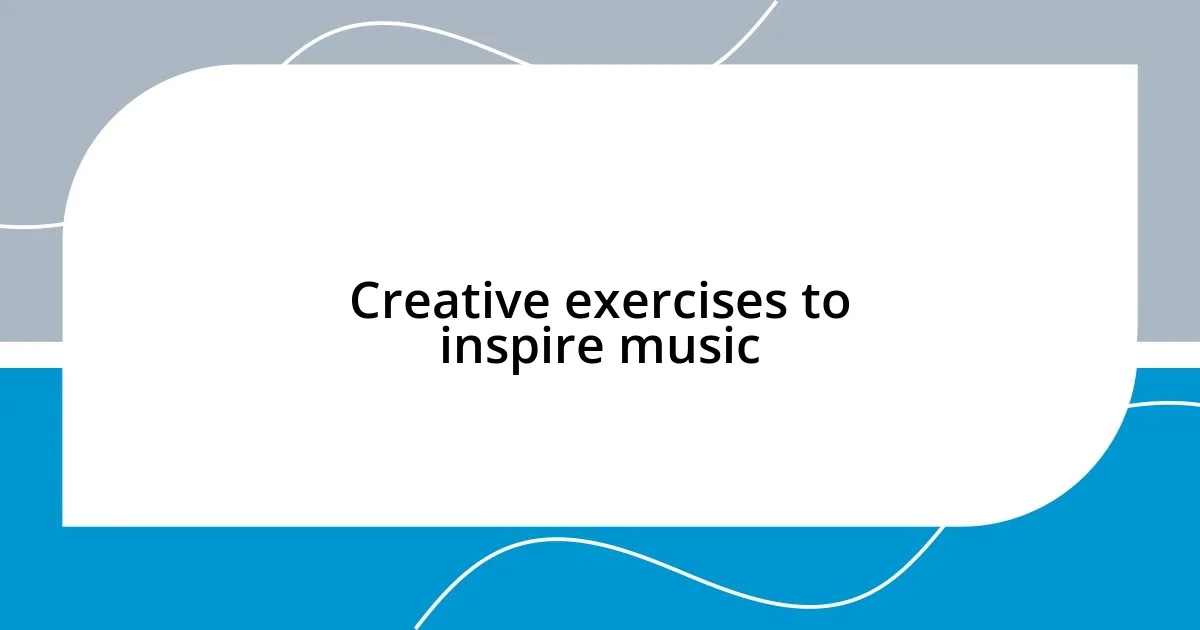
Creative exercises to inspire music
One creative exercise that has continually ignited my musical spark is the “free writing” technique. I like to set a timer for ten minutes and write down anything that comes to mind—thoughts, feelings, random phrases—without stopping. The lack of judgment during this process often leads to unexpected lyrical ideas or lovely melodic fragments. Have you ever tried writing without constraints? The liberation of not worrying about quality can produce some of the most authentic music!
Another practice I adore is utilizing visual art as inspiration. I often pull up a painting or photograph and let my imagination run wild, translating the colors and emotions into sound. I remember staring at a vibrant sunset painting, feeling a wave of nostalgia wash over me. As I closed my eyes, I imagined the music that would accompany that scene, and suddenly, a full melody began to form. Isn’t it remarkable how interconnected art forms can be?
Lastly, I find that playing games with musical constraints can spark creativity. For example, I sometimes challenge myself to compose a piece using only three notes or to write a sudden shift in genre. This playful approach not only lightens the mood but also encourages me to think outside the box. Could you imagine how refreshing it might feel to limit yourself creatively? These boundaries can often invite unexpected discoveries in your writing!
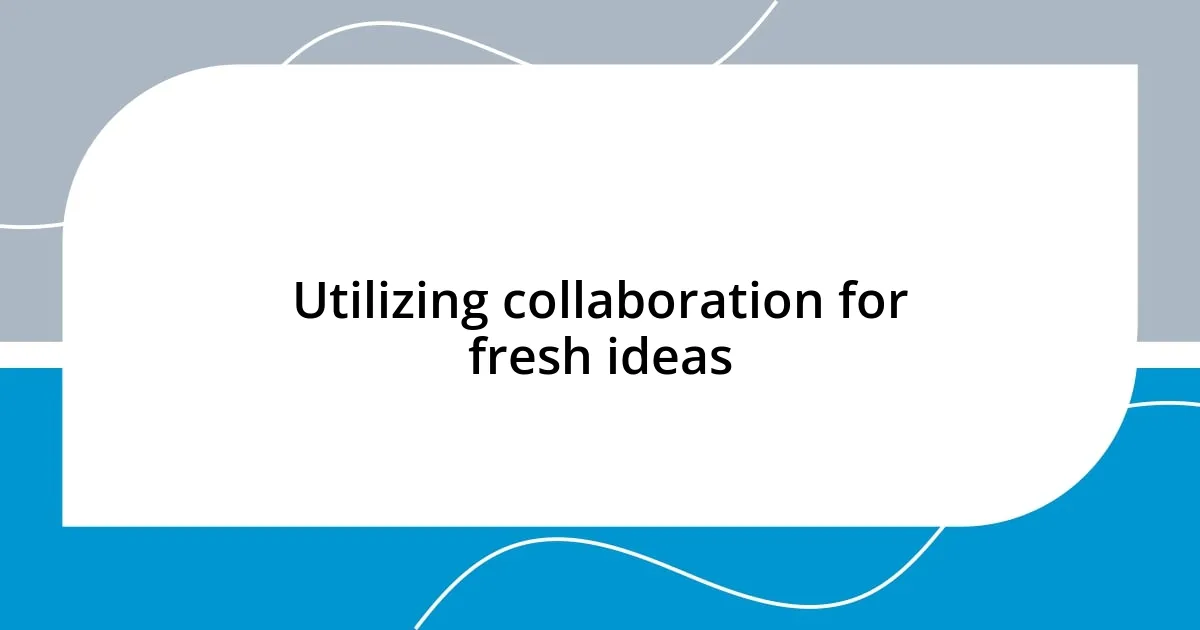
Utilizing collaboration for fresh ideas
Collaborating with other musicians has often transformed my creative process. There was a time when I felt completely drained, and a friend invited me to co-write a piece. As we exchanged riffs and lyrics, I felt the heaviness lift. It was as if their enthusiasm injected me with a fresh dose of inspiration, reminding me that connection is crucial for creativity.
One memorable collaboration was with a multi-instrumentalist who introduced me to sounds I had never considered. The fusion of our ideas led to unexpected moments of beauty, sparking melodies I would never have composed alone. Have you ever noticed how another person’s energy can completely shift the atmosphere? It’s like painting together—each brushstroke adds depth and texture, creating something far richer than what one could achieve alone.
I also cherish the brainstorming sessions that come with musical partnerships. I remember brainstorming with a lyricist, bouncing phrases off each other until we hit that sweet spot. The spark of creativity in those moments can feel electric, and it often leads to fundamentally new ideas. Don’t you think that sharing these experiences can often unlock breakthroughs we’d struggle to find on our own? By leaning into collaboration, I’ve found a wellspring of inspiration that continually rejuvenates my passion for composing.
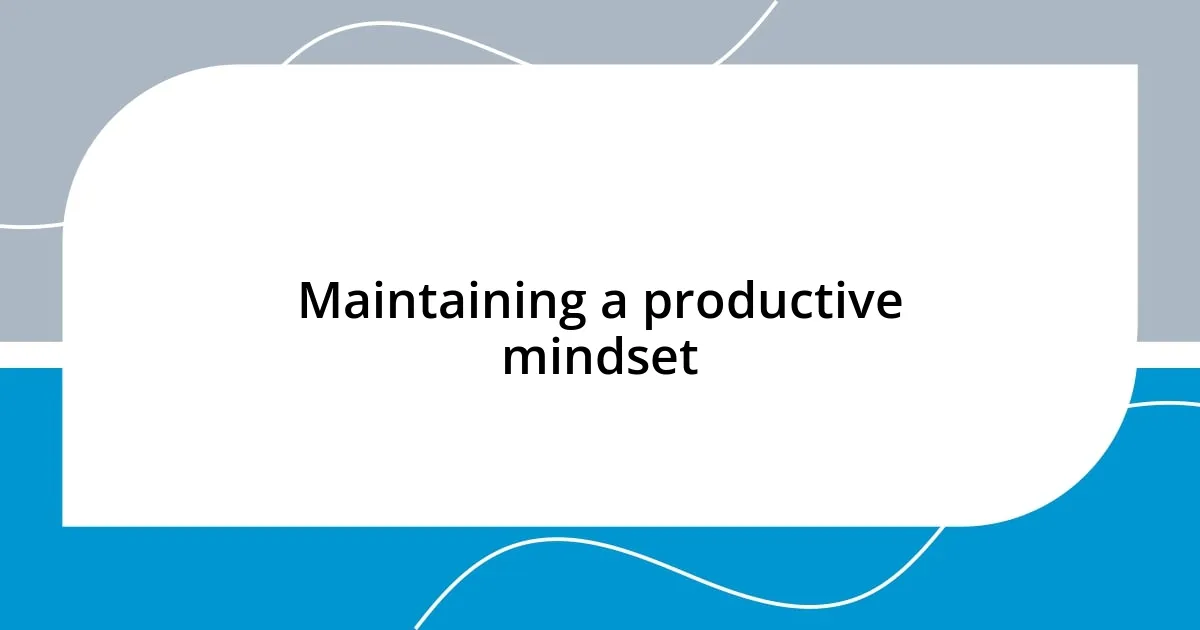
Maintaining a productive mindset
Maintaining a productive mindset is all about setting the right environment for creativity to flourish. I do my best work when my space feels inviting and inspiring. For instance, I remember rearranging my studio one afternoon—adding cozy lights and my favorite art pieces. Suddenly, the energy in the room shifted, and I found myself effortlessly composing for hours. How often do we overlook our surroundings and their impact on our creativity?
Another vital aspect I’ve learned is the power of regular breaks. I’ve had days when I was determined to push through a creative block, thinking it would just take a little more effort. But in reality, it only led to frustration. Now, I schedule short breaks to recharge—sometimes going for a quick walk or even just stretching. This simple practice has made such a difference. Isn’t it amazing how stepping away for a moment can lead to fresh ideas upon returning?
Lastly, I’ve come to appreciate the importance of self-compassion during creative dry spells. I used to beat myself up for not producing enough, which only made things worse. Reflecting on this, I remind myself that creativity isn’t linear; it ebbs and flows. By embracing those slower periods as part of the journey, I cultivate a mindset that nurtures rather than stifles inspiration. Beauty often lies in patience, doesn’t it? Recognizing this makes all the difference in fostering a productive mindset.


